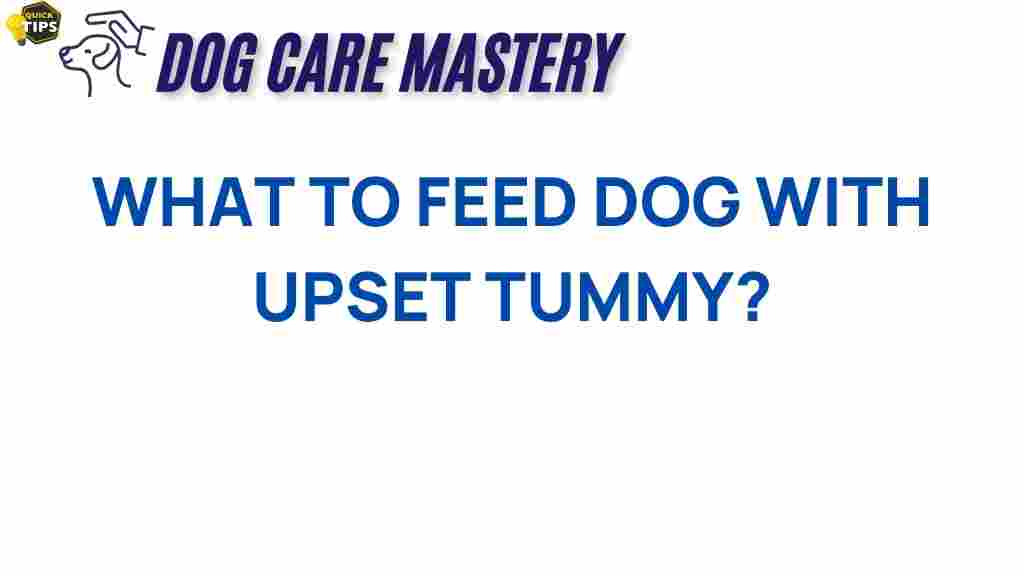Essential Tips: What to Feed Your Dog With an Upset Tummy – Dog Diet
When your furry friend experiences an upset tummy, it can be distressing for both of you. As a responsible pet owner, understanding how to adjust your dog’s diet during these times is essential. A proper dog diet can aid in recovery and restore your pet’s health. In this article, we will explore the best food options, what to avoid, and tips to help your dog feel better.
Understanding Your Dog’s Upset Tummy
Before diving into what to feed your dog, it’s crucial to understand the possible causes of an upset tummy. Dogs may experience gastrointestinal issues due to:
- Dietary indiscretion (eating something they shouldn’t)
- Food intolerances or allergies
- Infections (bacterial or viral)
- Parasites
- Stress or anxiety
Recognizing symptoms such as vomiting, diarrhea, or lethargy can help you determine if a change in your dog’s diet is necessary. If symptoms persist, consult your veterinarian for guidance.
Step-by-Step Guide: What to Feed Your Dog with an Upset Tummy
When your dog has an upset tummy, it’s essential to provide a gentle diet that is easy to digest. Here’s a step-by-step guide on how to adjust your dog’s diet effectively:
Step 1: Fasting
Initially, you may want to fast your dog for 12 to 24 hours. This allows their digestive system to rest and recover. Ensure they have access to fresh water to stay hydrated during this time.
Step 2: Introducing a Bland Diet
After the fasting period, gradually introduce a bland diet. This is crucial in a dog diet plan aimed at soothing an upset stomach. Recommended bland foods include:
- Boiled chicken (no skin or bones) – A great source of protein that is gentle on the stomach.
- White rice – A carbohydrate that can help firm up stools.
- Plain pumpkin puree – Excellent for digestion and can help with both diarrhea and constipation.
- Mashed sweet potatoes – Another great option for fiber and gentle on the tummy.
- Low-fat cottage cheese – A good source of protein that is easy to digest.
Mix these ingredients in small portions and observe how your dog reacts. If they tolerate the bland diet well, you can gradually increase the portion size.
Step 3: Gradually Reintroducing Regular Food
Once your dog shows signs of improvement, you can start reintroducing their regular dog food. Do this gradually over a few days by mixing small amounts of their regular food with the bland diet. Increase the proportion of regular food while decreasing the bland food until your dog is back on their normal diet.
Foods to Avoid During an Upset Tummy
While adjusting your dog’s diet, it’s equally important to know what to avoid. Certain foods can aggravate an upset stomach and should be strictly avoided:
- Fatty foods – High-fat content can lead to further gastrointestinal distress.
- Dairy products – Many dogs are lactose intolerant and may have difficulty digesting dairy.
- Spicy foods – These can irritate the digestive system and cause discomfort.
- Raw food – Raw meats can carry bacteria that may worsen gastrointestinal issues.
- Human snacks – Foods like chocolate, grapes, and onions are toxic to dogs and should be avoided at all costs.
Additional Tips for Managing Your Dog’s Diet
In addition to adjusting your dog’s diet, consider these tips to promote recovery:
- Monitor Hydration – Ensure your dog drinks plenty of water to prevent dehydration.
- Small, Frequent Meals – Instead of large meals, offer small portions multiple times a day.
- Keep Stress Low – Create a calm environment to help reduce anxiety-related tummy issues.
- Consider Probiotics – Probiotic supplements can help restore healthy gut flora.
Troubleshooting: When to Seek Veterinary Help
While many cases of upset tummies resolve with dietary adjustments, some situations require veterinary intervention. Seek help if you notice:
- Persistent vomiting or diarrhea lasting more than 24 hours
- Blood in vomit or stool
- Severe lethargy or signs of pain
- Refusal to eat or drink for more than 24 hours
- Signs of dehydration (dry gums, skin elasticity)
Your veterinarian can provide a proper diagnosis and treatment plan tailored to your dog’s specific needs, ensuring they receive the best care possible.
Conclusion: Ensuring Your Dog’s Well-Being
Feeding your dog a proper diet during an upset tummy is crucial for their recovery. By following the steps outlined above and being mindful of what to include and exclude from their diet, you can help your canine companion feel better and return to their playful self in no time.
Always remember, if in doubt about your dog’s health or diet, it’s best to consult your veterinarian for personalized guidance. For more information on dog nutrition and diet options, check out this helpful resource.
With the right approach, a balanced dog diet can make a significant difference in your dog’s health and happiness.
This article is in the category Health and created by dogcaremastery Team
